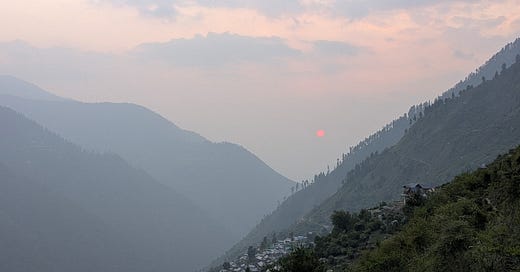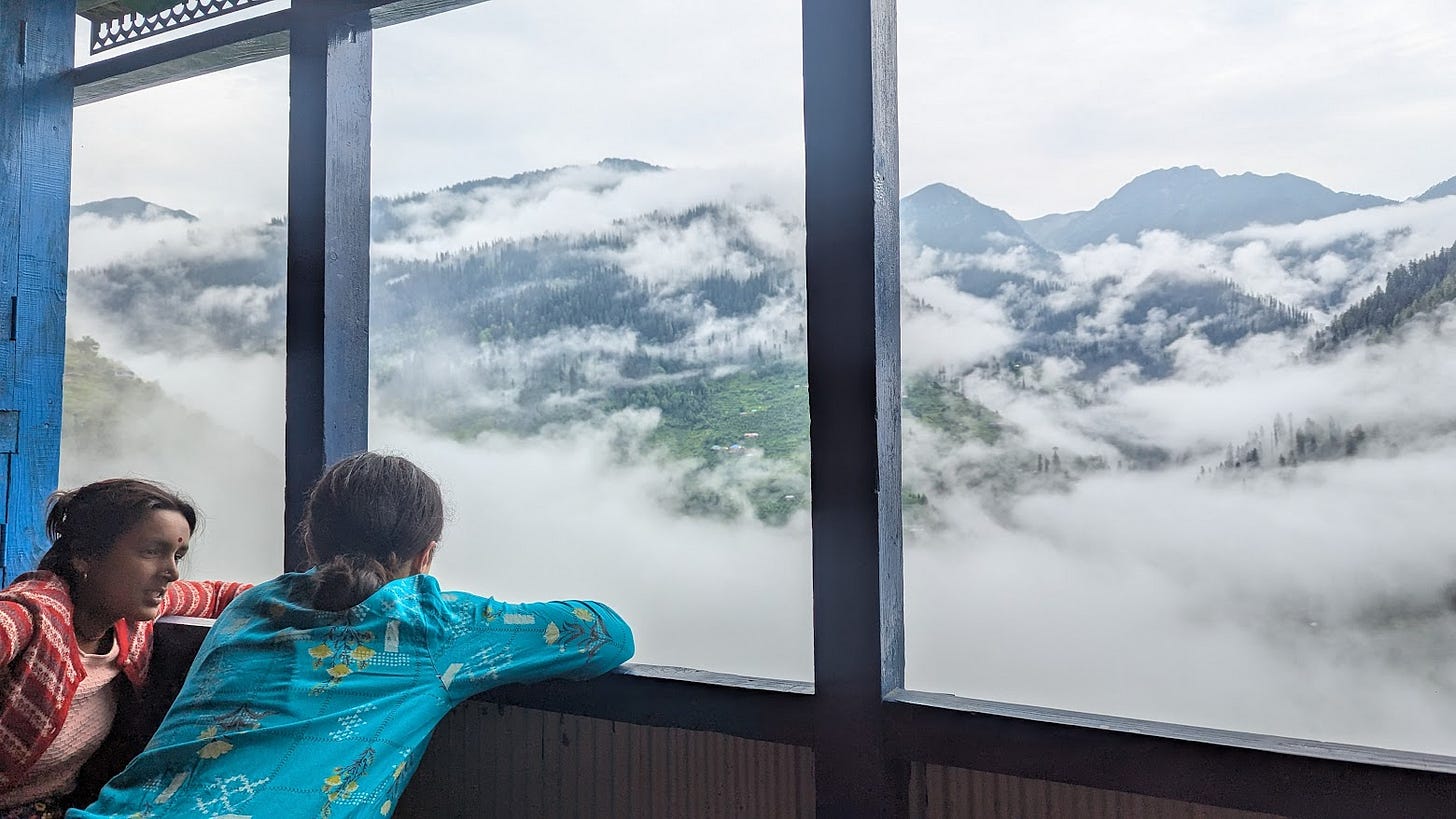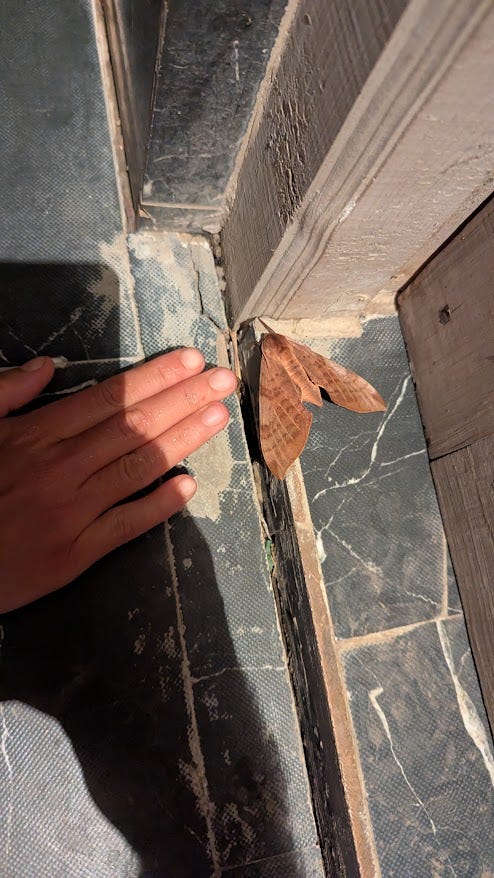The last two weeks, Shar and I were in Chippni along with another intern at Heco, Aatmaj. Chippni is a small village near Bathad (marked in the completely wrong valley on Google Maps). Rather than give a brief overview of everything we got up to, I’ve focused on what happened Tuesday the 17th of June and you can extrapolate the rest.
Woke up to persistent rain. This was a bummer because the school presentation (Why Forest Fires are a Bad Plan) was today and we had hoped to do an outdoor running game and indoor drawing game. Now it would just be the indoor game. Also the three local women we are hoping to involve in the Chippni Assisted Natural Reforestation Project (mouthful) couldn’t come because of the rain. Stephan, the founder of Heco, messaged, “Guys, just leave it. Even kids won’t go to school.” After confirming that the daughters living at our homestay were still going to school we decided to go ahead with the presentation anyway.
We had no idea how many kids we would be presenting to. Somewhere between 30 and 100? Despite having made the appointment the week before, none of the teachers seemed to know we were coming, but they also weren’t too fazed about handing over the three oldest classes for an hour. There were lots of students. “More come when its raining since there’s no work to do in the fields.” When the clock struck 11:04, we headed to the hall which wasn’t much bigger than a family house. Inside there were about 80 students sitting on the floor. They seemed very used to sitting touching the two people either side as well the person front and back.
Applause. We sat down and were handed a microphone by a teacher which was connected to one of those light up party speakers at the back of the hall. With the rain on the roof, it was useful to have our voices amplified, but the speaker made them reverberate like we were in a cathedral. It was hard not to sound authoritarian. Shar and I both got rounds of applause for being from somewhere outside India. Well done us. My mostly memorised spiel in Hindi went well enough. Shar and Aatmaj filled in all the specifics of our message and then we launched into the pictionary game, which can be tricky to explain in English to a group of 10 adults. So in Hindi to a group of 80 kids, well… 20 minutes of chaos and paper being thrown around later, we called the room back to order. A single teacher had come in during the chaos of the game but made himself scarce by the time we finished. Without any obvious staff members to talk, we left. Aatmaj joked I should have said in the presentation, ‘in Amrika you just have to push a button and a whole forest pops up.’ It's true we could have said whatever we wanted and they might have believed us. It seemed the kids were used to being lectured and doing rote memorization, not any creative learning.
After slinking out, we went to the Bathad waterfall about 100m away from the school. We had been swimming in the river or waterfall almost every day, but today it was a thundering cauldron and not so inviting. Aatmaj slipped, stubbing his toe badly. He thought he would need bedrest for at least two days now. After getting back to the house, I researched research in the Himalaya and and practiced Hindi with ChatGPT. Shar edited a video of the women dancing on the chaat (roof) in traditional dress and Aatmaj settled into two days of bedrest. A fun detail is that all three of us have been sharing one big bed.
In the afternoon, Shar and I headed to Chippni to have chai with Gullo. Her husband had just returned from 17 days harvesting a rare high altitude species of super garlic from ~5000m. When they heard why Aatmaj wasn’t with us, the husband pulled out a tightly woven basket. Inside I could see various organic and manufactured items. As the husband searched, Gullo pulled out an old and slightly broken pair of sunglasses and put them on, grinned, and then put them back in the basket. Finally the husband pulled out a chunk of what looked like charred clay. He cracked a corner off and said "put a small bit of water on a rock and then rub this back and forth through it until it makes a paste. Apply a thick layer of the paste to the swollen area morning and night for 4 days. Then your friend will be fixed. This is a medicine from the forest. Very good."
After chai, we headed up to the village rock. There was a group of 15 or so women gathered there so Shar sat with them while I played volleyball without a net and with a very soft and delaminating ball. Turns out the net and the ball quality aren’t what make volleyball fun to play. Then Shar and I talked for a while to a man who knew some English (only 2-3 people in the village could hold a conversation in English). He thought most of the locals found it hard to think very hard into the future and the long term benefits of planting trees/protecting forest. When he was young (30 years ago) there had been many more trees around and much larger ones in the forest.
Then we walked to the cold water spring with some of the village boys. At the spring, Shar told me the women’s meeting had been about a new kind of menstrual pad that was better than plastic ones. Most women use cloths though and only pads when going out to town. The salesperson had done an experiment where she pulled down on a volunteer's arm, overbalancing her. Then the salesperson had the volunteer squeeze a part of the pad for 2 minutes that supposedly releases strength hormones. Then she slapped it on the volunteer’s neck and pulled down on her arm again. This time she didn’t overbalance. The salesperson had also claimed you weren’t supposed to eat milk or greasy food while on your period and lots of other jiggery pokery. It made me think that people in remote villages throughout the Global South probably get a lot of outsiders coming in and talking to them about women’s health, ecology, bank accounts, new types of crops, and all sorts. It's probably quite hard for the locals to distinguish what is legit from what is not. Then we walked back down to our homestay and ate dinner which was roti and spiced capsicum.
A few other moments and interesting facts:
Most people here only eat one meal a day sometime after 8pm. This is supplemented with chai, rusk, ‘biscoot’, and other small bits throughout the day. What is hunger if it is everyday?
A man showing us his adopted porcupine in the barn/basement of his house.
A man carrying a full size closet the 40min hike straight uphill from Bathad to Chippni, mostly on his head.
An extraordinary abundance of marijuana growing as a weed everywhere you look.
Sending you all love from the ‘high’ Himalaya,
Oak












That Chipni sunset phot is beautiful... I try and get a Matariki Morning one here (to swap!) once this wet front moves through xx
Thanks Oak...and Shar for lending your hand for scale! (Brings back memories of being in the hills with Sam, and I was often asked to stand against rock faces 'for scale'... in the good old 36 frame films of the day, I was frequently that small person at the base of the cliff/boulder/moraine!)
The tension between hocus-pocus/marketing/ illusion /factual information must be frustrating at times... especially when trying to educate for social change... even the different interpretations on whether kids would be in school or not, on a rainy day, is almost 'mythical'!! It's an interesting observation that 'engaging students' by creativity and integration of ideas, is not comfortable for everyone/every context.... but also a sad truth that as 'not-from-here' you could say almost anything and it would be believed.... those sorts of inequitable attitudes seem like some of the hardest to handle 😕
Keep breathing deep and with long exhales when these frustrations dig deep into you... and thanks for letting us in again with your insights.
Love to you both from a very damp Otepoti xx